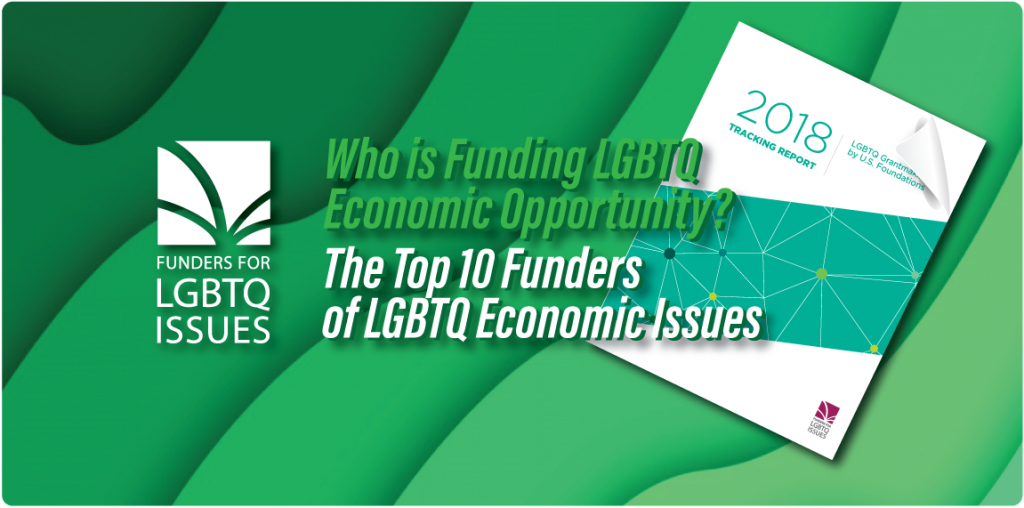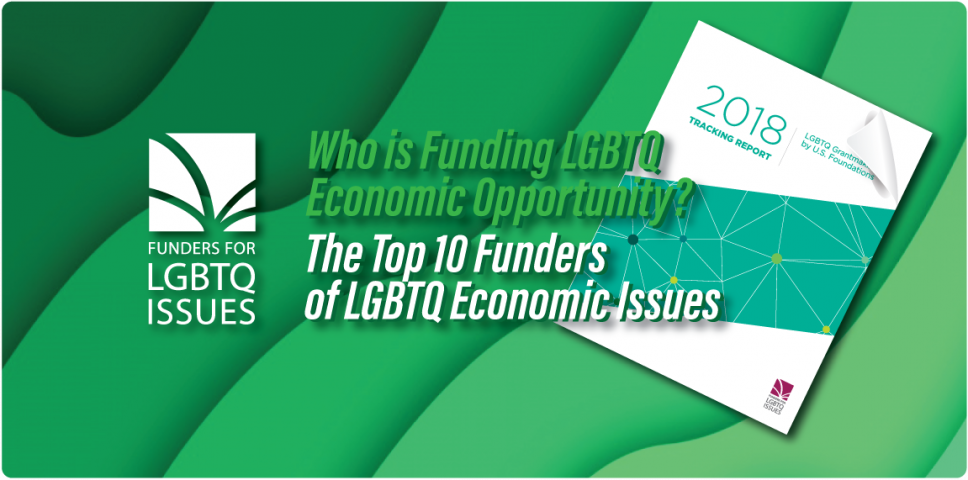
Who is Funding Economic Opportunity for LGBTQ Communities?
Who is Funding Economic Opportunity for LGBTQ Communities?
By: Funders for LGBTQ Issues Staff on April 23, 2020
As the global COVID-19 pandemic continues to upend life as we knew it, LGBTQ people are often uniquely impacted. With societies around the world taking unprecedented steps to slow the spread of the virus and “flatten the curve,” millions have lost their jobs as countless employers close up shop, many for good. With members of both the formal and informal economy finding themselves affected by shelter in place orders, a pandemic economy is taking shape as the nation is forced to acknowledge a vast subset of essential workers who are often overlooked in normal times. Workers now deemed essential – disproportionately women, people of color, and immigrants – continue to risk exposure to illness, often without adequate pay or access to healthcare. This pandemic is a public health crisis to be sure but it is also an impending economic disaster, one made worse by the simmering inequality ailing the American economy.
Now months into this unprecedented crisis, we stare down a likely severe economic downtown and profound economic uncertainty in the months and years ahead. We also know that for many LGBTQ people, already dealing with well documented economic disparities, this crisis will hit particularly hard.
LGBT people collectively have a poverty rate of 21.6 percent, compared to 15.7 percent for their cisgender, straight counterparts. The rate of poverty for transgender people is a staggering 29.4 percent. Persistent stigma and inadequate legal protection from discrimination means that LGBT people are more likely to face housing insecurity, are more likely to be renters, and are more likely to be homeless. Additionally, we know that LGBTQ people, particularly LGBTQ people of color and those with disabilities, are more likely than their peers to experience food insecurity. These sobering statistics describe realities before COVID-19. For so many in our community, the current crisis will only compound these preexisting conditions with devastating outcomes.
While direct payouts from the Coronavirus Aid, Relief, and Economic Stimulus (CARES) Act to qualifying Americans will help some, including over 6.5 million LGBT Americans who will receive aid, these one-time payments will do little to address the systemic discrimination and deep inequality that so stubbornly keep so many LGBTQ people in precarious cirucumstances.
In the face of these dire conditions, philanthropic investment to address economic issues faced by LGBTQ people remains low. Between 2017-2018, philanthropic support for LGBTQ economic issues totaled nearly $16 million. While support for this issue area has been on a steady rise, it accounted for just 6 percent of all philanthropic support for LGBTQ communities in 2018.
Funding for LGBTQ Economic Issues (2014-2018)
| Year | Amount |
|---|---|
| 2014 | $4,478,342 |
| 2015 | $5,635,532 |
| 2016 | $6,028,559 |
| 2017 | $6,616,290 |
| 2018 | $9,329,258 |
In our annual resource tracking report we count three sub-issues under the economic issues category. Those categories include funding for food security, funding related to labor and employment, and support for efforts to address homelessness. The vast majority of funding related to economic well being in the LGBTQ community is focused on housing insecurity and homelessness. Between 2017-2018, support to address LGBTQ housing and homelessness made up nearly 85 percent of all funding for LGBTQ economic issues.
Funding for LGBTQ Economic Issues, by Sub Issue (2017-2018)
Between 2017 and 2018, the top ten funders of economic issues related to LGBTQ communities accounted for over 50 percent of all funding in the issue area.
Top Ten Funders of LGBTQ Economic Issues (2017-2018)
| Organization Name | Amount | |
|---|---|---|
| 1. | Harry and Jeanette Weinberg Foundation | $1,600,000 |
| 2. | Community Foundation for Greater Atlanta | $1,340,190 |
| 3. | M.A.C. AIDS Fund | $1,195,000 |
| 4. | Arcus Foundation | $1,110,000 |
| 5. | H. van Ameringen Foundation | $890,000 |
| 6. | Wells Fargo | $596,036 |
| 7. | Broadway Cares/Equity Fights AIDS | $495,250 |
| 8. | Palette Fund | $465,075 |
| 9. | Ford Foundation | $417,500 |
| 10. | Keith Haring Foundation | $365,000 |
(You can learn more about the landscape of philanthropic support for LGBTQ communities in our latest report, 2018 Tracking Report: Lesbian, Gay, Bisexual, Transgender and Queer Grantmaking by U.S. Foundations. Please note, that this analysis only captures funding specifically focused on advancing the LGBTQ economic issues of food security, housing and homelessness, and labor and employment. Other critical funding, such as that which seeks to advance LGBTQ nondiscrimination protections or sex worker rights, also impacts LGBTQ people’s economic opportunity and is captured elsewhere in the report.)
As we know the road to recovery will be long, we look forward to working with our members and the broader field of philanthropy to increase funding for LGBTQ economic issues. We also look forward to advancing economic opportunity for LGBTQ communities through our budding public policy efforts. Our work on that front continues to evolve from encouraging public comments from philanthropy on rules changes that may adversely affect LGBTQ people to joining United Philanthropy Forum and many others to ensure that nonprofits can access federal stimulus funds. Because just as many individuals and families in our community are suffering, so too are many nonprofits that provide critical services.
We know this is not a short journey, but we are in it for the long haul. Below is a list of additional resources focused on LGBTQ economic issues.
- National LGBTQ Anti-Poverty Action Network was formed in October of 2018 to increase focus on LGBTQ poverty issues by both LGBTQ and anti-poverty organizations. The network produced a groundbreaking report examining poverty and inequality in the LGBTQ commnuity.
- Tyrone Hanley from the National Center for Lesbian Rights and Co-Coordinator of the National LGBTQ Anti-Poverty Action Network outlines ways to support low-income LGBTQ people and highlights issues to consider to ensure federal COVID-19 assistance reaches those in need.
- The Movement Advancement Project is publishing a blog series on issues impacting the LGBTQ community through the pandemic, including features on economic insecurity and the dire public health emergency putting incarcerated people at risk.
- The Williams Institute publishes critically important research on sexual orientation and gender identity to inform law and public policy, including a focus on economics and poverty. Recently the institute published research on the Impact of the CARES Act on LGBT People.
- Funders for LGBTQ Issues also has an online issue brief dedicated to funding LGBTQ economic opportunity.

